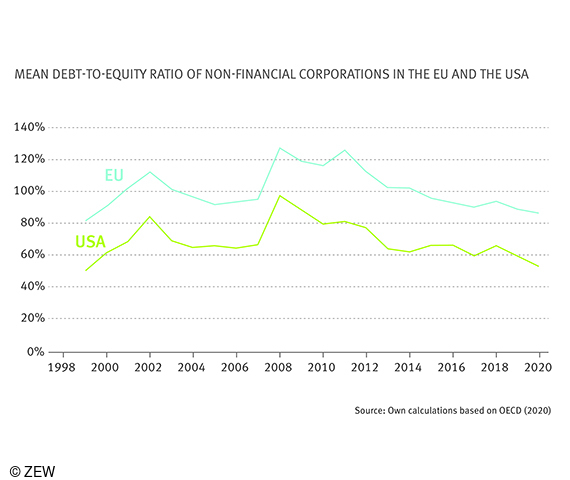Debt-Equity Bias Should Be Addressed on National Rather Than on EU Level
ResearchThe economic crisis following the COVID-19 pandemic has increased the debt levels of corporations and reduced the level of investments. Companies can use both equity and debt capital to finance investments. From a tax perspective, interest payments on debt are generally deductible from the corporate tax base, while costs related to equity are not. This debt-equity bias is a deep-rooted issue in today’s tax system and inhibits equity-financed investments. A recent ZEW policy brief shows that harmonisation at the European level is not suitable for solving the tax-induced distortion. Instead, the researchers recommend addressing the debt-equity bias on national level, e.g. by implementing a dual income tax.
“The structural tax-induced distortion of financing decisions is undesirable and leads to adverse economic effects,” says Professor Christoph Spengel, ZEW Research Associate and co-author. To provide a stable and supportive tax environment for a sustainable recovery after the coronavirus crisis, the European Commission published a framework on “Business Taxation for the 21st Century” in May 2021. Besides other proposals, a debt equity bias reduction allowance (DEBRA) should be developed to address the tax-induced distortions of debt financing. A public hearing of the European Economic and Social Committee is taking place today, to which Professor Christoph Spengel has been invited. For a legislative proposal, the EU Commission identified three possible concepts to address the debt-equity bias, which are assessed by the researchers as follows:
- A Comprehensive Business Income Tax (CBIT) disallows the tax-deductibility of any financing costs and thus, would discourage corporate investments. To counteract the potential negative investment effects, EU Member States would have to decrease their statutory corporate income tax rate. However, the fiscal scope for this policy measure is extremely limited due to the economic consequences of the COVID-19 pandemic.
- The second concept, an Allowance for Corporate Equity (ACE), which provides for the deductibility of notional interest on either all equity or new equity, could stimulate corporate investments. However, it provides new tax planning opportunities for corporations and could result in tax revenue losses for EU Member States.
- The proposal to align the treatment of debt and equity financing by deducting a notional return on all capital, a so-called Allowance for Corporate Capital (ACC), is also unsuitable. Due to the high sensitivity of an ACC to the notional interest rate, its effects cannot be determined a priori, resulting in great uncertainty for corporations and EU Member States.
In order to address the debt-equity bias in the long run, the overall treatment of financing costs and capital income has to be considered. This involves not only corporate income taxation but also shareholder taxation, which has so far been neglected by the EU Commission. Therefore, the authors appeal not to introduce a CBIT, an (incremental) ACE, or an ACC in an EU-wide harmonised way, as all concepts require subsequent adjustments in the personal income tax. So far, this competence lies in the sole competence of the Member States. “Policymakers should not address the debt-equity bias through harmonisation at the European level. Instead, we recommend eliminating the tax-induced distortion between debt and equity financing at the national level, for example by introducing a dual income tax,” says Christoph Spengel. A dual income tax establishes not only financing neutrality, but also neutrality with regard to profit distributions and legal forms. Consequently, according to the authors, a dual income tax is well suited to achieve the goals set out by the European Commission.
